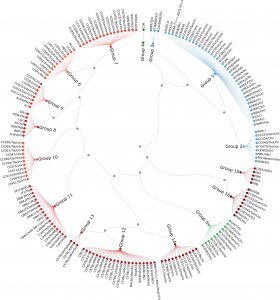International consortium led by UNC Departments of Genetics and Computer Science publishes manuscript on the development and testing of a new tool to enhance the value of the laboratory mouse in biomedical research.

UNC researchers in the Departments of Genetics and Computer Sciences led an international consortium in the development and testing of a new tool to enhance the value of the laboratory mouse in biomedical research. This work is described in an upcoming manuscript in the journal “Genetics.” The tool, known as the Mini Mouse Universal Genotyping Array (MiniMUGA), was developed to improve our understanding of the genetics of mouse models and to improve rigor and reproducibility in experiments using mouse models.
The UNC School of Medicine labs of Fernando Pardo-Manuel de Villena, PhD, and Martin Ferris, PhD, collaborated with Leonard McMillan of UNC’s Department of Computer Science to design, develop and test the new genotyping array to identify the genetic background of commercial and lab-derived mouse strains. In addition, MiniMUGA can be used to identify the presence of a variety of genetic constructs (pieces of DNA which researchers insert into mice to model specific traits).
Remarkably, 69 researchers spanning the entire UNC’s campus (fifteen departments and six centers/programs at UNC across the SOM, CAS, the School of Pharmacy and the School of Public Health), as well as investigators at six other institutions, contributed to this study. In all, this consortium genotyped over 6,000 mouse and cell line samples from their respective labs to test the specificity and sensitivity of this tool. The NIH funded Mutant Mouse Resource and Research Center (MMRRC) at UNC, led by Dr. Terry Magnuson (SOM, Genetics) has incorporated MiniMUGA as a genetic standard to enhance its mission to archive, curate and distribute mice carrying mutations relevant to biomedical research. The adoption of the array by the MMRRC, as well the already widespread use by individual labs, is evidence of the impact of this tool to ensure rigor and reproducibility using laboratory mice.
The MiniMUGA array was developed by researchers at UNC under a contract with Neogen, Inc.
